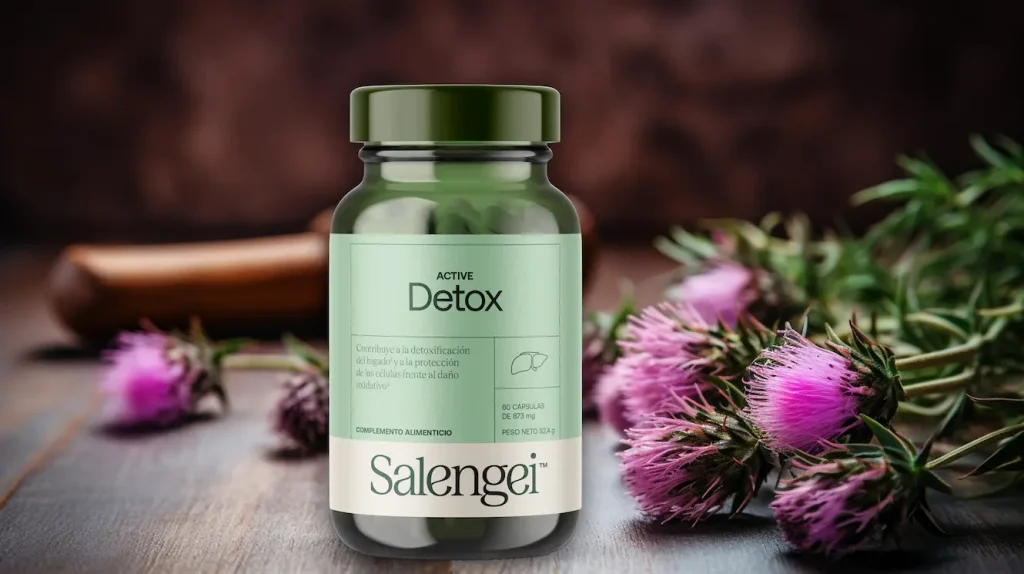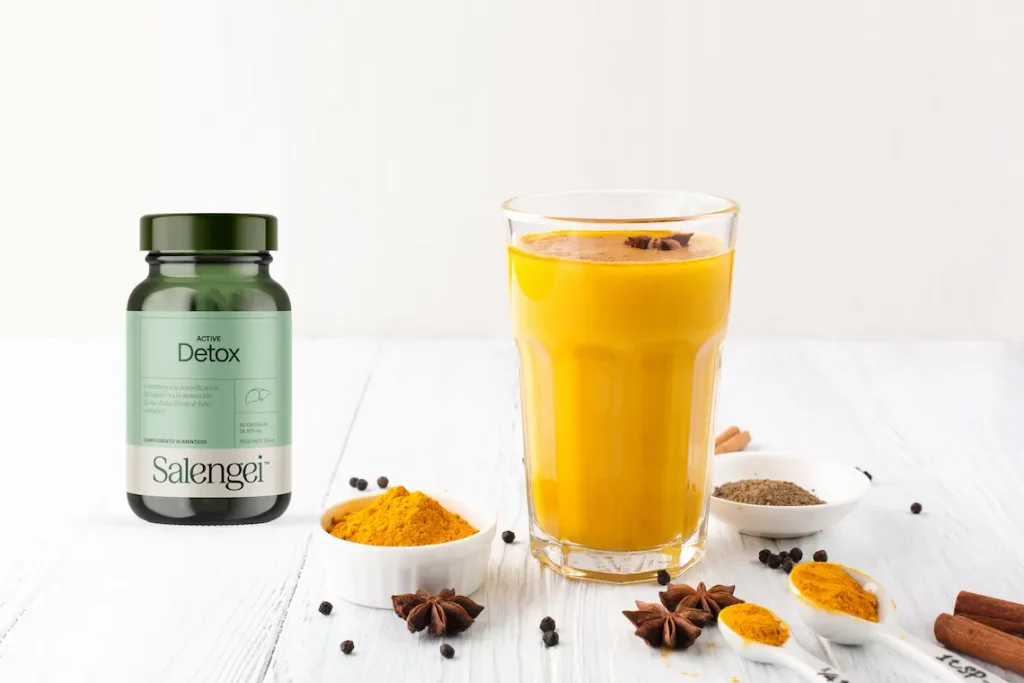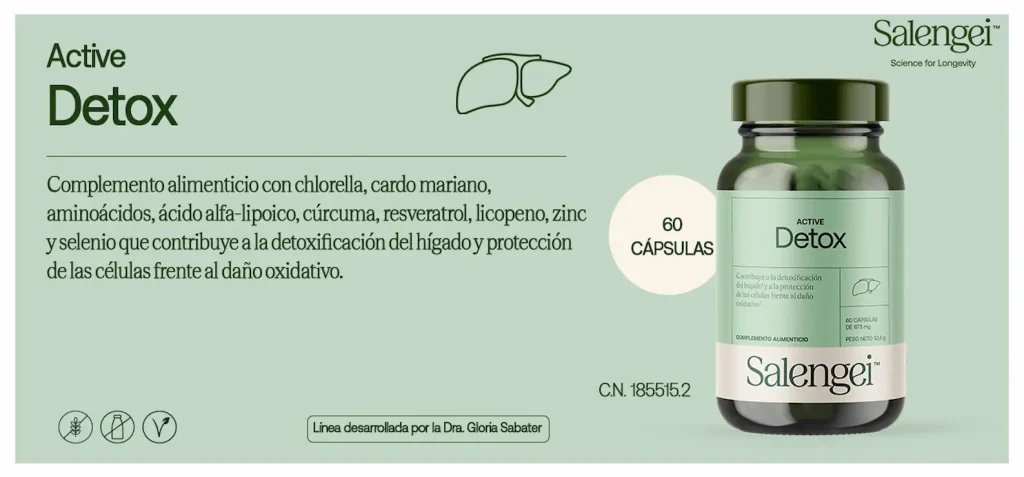Liver detox: keys to cleansing the liver naturally

The liver is one of the most sophisticated and vital organs in the body. It is responsible for a wide range of functions essential for metabolic balance and homeostasis. Among its main tasks is liver detoxification. This is an ongoing process by which it neutralizes toxins, metabolizes drugs, and regulates the biochemical composition of the blood. However, factors such as excessive consumption of ultra-processed foods, exposure to environmental pollutants, chronic stress and a sedentary lifestyle can compromise their functional capacity. This increases the toxic load in the body. It makes it even more important to cleanse the liver naturally to maintain its performance and health.
In this scenario, it is essential to adopt strategies that optimize liver function and enhance its cell regeneration mechanisms. Ingredients such as milk thistle, chlorella, turmeric , and alpha-lipoic acid have been extensively studied for their role in protecting and restoring the liver.
In this article, we will analyze their impact on detoxification processes, their antioxidant and anti-inflammatory action, and how they can be effectively integrated into a liver detox strategy, that is, how to cleanse the liver naturally based on scientific evidence.
Intermittent fasting and liver detoxification
Intermittent fasting has been the subject of numerous scientific studies due to its impact on metabolic regulation, autophagy, and cellular detoxification. During periods of fasting, the body activates adaptive mechanisms. These promote the purification of the liver, allowing the elimination of toxic compounds. They also optimize energy metabolism. One of the most relevant processes is autophagy. This is a highly regulated cell degradation system. It facilitates the elimination of damaged proteins and dysfunctional organelles. This prevents the accumulation of substances that are harmful to liver homeostasis. https://doi.org/10.1093/nutrit/nuae070
The liver, being the main detoxifying organ, benefits significantly from fasting. This is due to the reduced metabolic load associated with constant digestion of food. During fasting, the body changes its predominant energy source. It goes from glucose metabolism to theoxidation of fatty acids and ketone bodies. This decreases oxidative stress and improves mitochondrial function in hepatocytes. This metabolic change reduces the production of free radicals. It prevents cumulative cell damage, optimizing liver function and prolonging cell longevity.
Benefits of intermittent fasting and liver detox
Additionally, studies have shown that fasting stimulates mitochondrial biogenesis and promotes the activation of AMP-activated protein kinase (AMPK). This is a key enzyme in the regulation of energy metabolism and liver inflammation. This activation improves insulin sensitivity, modulates inflammation at a systemic level and enhances the liver’s ability to eliminate toxins accumulated in adipose tissue, preventing their redistribution to other sensitive organs such as the brain. DOI: 10.1016/j.cmet.2017.09.024
However, it is important to note that the sudden release of toxins stored in adipose tissue during prolonged fasting can overload liver detoxification systems. This could generate transitory symptoms such as fatigue, headaches or digestive discomfort. To mitigate these effects, it is recommended to accompany the practice of fasting with an adequate intake of essential micronutrients. In the next paragraph we will investigate a little more.
The best natural allies for liver detoxification
The active ingredient in milk thistle, silymarin

Milk thistle (Silybum marianum) is one of the most studied medicinal plants for its hepatoprotective effects and its ability to optimize liver detoxification processes. Its most relevant active ingredient is silymarin, a complex of flavonolignans composed mainly of silybin, silicristin and silydianin. These molecules have been shown, in multiple studies, to possess antioxidant, anti-inflammatory and antifibrotic activity, making them key tools for protecting and regenerating liver tissue damaged by oxidative stress and the accumulation of toxins. DOI: 10.1159/000113648
At the molecular level, silymarin acts by modulating various cellular pathways. One of its main mechanisms is the inhibition of oxidative stress by enhancing the expression of endogenous antioxidant enzymes such as superoxide dismutase (SOD) and glutathione peroxidase (GPx). This effect is essential in the protection of hepatocytes against damage induced by free radicals and reactive oxygen species. These are generated as byproducts of metabolism and exposure to environmental toxins. https://doi.org/10.3390/molecules27092641
In addition, silymarin has been observed to exert a modulating effect on the signaling pathway of nuclear factor kappa B (NF-κB), a key regulator in liver inflammation. Inhibition of this pathway reduces the production of proinflammatory cytokines such as TNF-α, IL-6 and IL-1β, which are involved in the development of chronic liver pathologies such as non-alcoholic fatty liver disease and liver fibrosis. https://doi.org/10.1016/j.lfs.2020.118173
Another relevant aspect is its ability to stimulate protein synthesis in hepatocytes. This promotes cell regeneration and the repair of damaged liver tissue. In addition, it improves liver function in people with chronic liver diseases, such as hepatitis or cirrhosis. Clinical evidence supporting its use as an adjuvant in treatment. https://doi.org/10.1016/j.biopha.2021.112409
This combination makes milk thistle a key option to cleanse the liver naturally, optimizing its regeneration capacity and protection against toxins.
Chlorella
Chlorella is a single-celled microalgae belonging to the Chlorellaceae family, recognized for its exceptional ability to promote liver detoxification and improve the elimination of toxins accumulated in the body. Its nutritional profile is highly beneficial. It contains a significant concentration of chlorophyll, bioactive peptides, polysaccharides, and antioxidants, which play a key role in protecting the liver and modulating the immune system.
From an antioxidant point of view, chlorella is rich in carotenoids, vitamin C, and phenolic compounds. They play a crucial role in neutralizing free radicals and preventing oxidative damage in hepatocytes. Its ability to induce the expression of glutathione peroxidase (GPx), superoxide dismutase (SOD) and catalase (CAT) reinforces its hepatoprotective role and contributes to the regeneration of liver tissues affected by metabolic stress or exposure to hepatotoxic agents.
The role of chlorella in liver detoxification
One of the most studied mechanisms of chlorella is its ability to chelate and remove heavy metals, such as mercury, cadmium, and lead, which tend to bioaccumulate in liver and neurological tissues, interfering with normal cellular function. The presence of cysteine-rich peptides and sulfated polysaccharides in the cell membrane of chlorella allows the adsorption and elimination of these toxic metals through the gastrointestinal tract, reducing the hepatic burden and preventing oxidative damage associated with their accumulation. https://doi.org/10.1007/s10534-021-00285-1
In addition, chlorella works by stimulating the activity of phase I and phase II liver detoxification enzymes. This promotes the biotransformation of xenobiotics and favors their safe excretion. In phase I, compounds such as cytochromes P450 convert lipophilic substances into more reactive metabolites. They are then conjugated in phase II through processes of sulfation, glucuronidation and acetylation, facilitating their elimination through bile or urine. DOI:10.7762/cnr.2021.10.1.83
Another key benefit of chlorella is its impact on modulating the gut microbiota, a determining factor in liver health. Studies have shown that the polysaccharides present in chlorella favor the growth of beneficial bacteria such as Lactobacillus and Bifidobacterium, while inhibiting the proliferation of pathogenic species that generate endotoxins capable of inducing liver inflammation.
Thanks to all these benefits, chlorella is an excellent option to cleanse the liver naturally and optimize its function.
Turmeric

Turmeric (Curcuma longa L.) is a plant of the Zingiberaceae family, widely used in traditional and modern medicine for its anti-inflammatory, antioxidant and hepatoprotective properties. Its main bioactive compound, curcumin, has been shown to be a potent modulator of inflammatory and oxidative processes that affect liver health. Its protective action is due to its ability to regulate molecular signaling pathways involved in detoxification, cell repair and liver metabolism.
At the molecular level, curcumin exerts its anti-inflammatory effect by inhibiting the nuclear factor kappa B (NF-κB) pathway, a key regulator of the chronic inflammatory response in the liver. Their suppression reduces the production of pro-inflammatory cytokines such as TNF-α, IL-1β and IL-6. The latter are molecules involved in the development of liver diseases such as non-alcoholic hepatic steatosis (NAFLD) and liver fibrosis. Studies have shown that curcumin administration significantly improves liver function in patients with fatty liver, reducing transaminase levels and oxidative stress. https://doi.org/10.1002/ptr.8442
In addition to its anti-inflammatory activity, turmeric is a potent inducer of liver detoxification. It stimulates the expression of phase II enzymes, such as glutathione S-transferase (GST), essential for the conjugation and elimination of xenobiotics and lipophilic toxins. This mechanism allows the liver to metabolize and excrete potentially harmful compounds more efficiently, contributing to the reduction of the body’s toxic load.
Other Key Aspects of Curcumin
Another key mechanism of curcumin in liver protection is its ability to regulate lipid metabolism and improve insulin sensitivity. Metabolic dysfunction of the liver is one of the main causes of fat accumulation and liver damage. Curcumin activates the AMP-activated protein kinase (AMPK) pathway. It promotes the oxidation of fatty acids, reducing lipogenesis and improving insulin resistance. Fundamental effects in the prevention of metabolic liver diseases. These include NAFLD and non-alcoholic steatohepatitis (NASH).
From an antioxidant standpoint, curcumin is able to increase glutathione (GSH) levels. It is the liver’s main intracellular antioxidant, and boosts the activity of key enzymes such as superoxide dismutase (SOD), catalase (CAT), and glutathione peroxidase (GPx). This strengthens the liver’s resistance to free radical-induced oxidative damage and reduces lipid peroxidation, a process implicated in the deterioration of hepatocytes and the progression of chronic liver diseases. https://doi.org/10.1002/ptr.8165
Thanks to these powerful effects, turmeric is presented as an excellent option to cleanse the liver naturally, promoting its protection and regeneration.
Alpha-lipoic acid, resveratrol, and lycopene
Alpha-lipoic acid (ALA) is a powerful antioxidant with a unique ability to act in aqueous and lipid media. This allows it to neutralize free radicals in different parts of the cell and regenerate other antioxidants such as vitamin C and glutathione. Its role in liver detoxification lies in its ability to reduce oxidative stress in hepatocytes and improve mitochondrial function, protecting the liver against inflammation and toxin accumulation.
Resveratrol, a polyphenol present in grapes and red fruits, has demonstrated hepatoprotective effects thanks to its ability to modulate the expression of genes associated with inflammation and lipid metabolism in the liver. Its action on the sirtuin pathway (SIRT1) favours the activation of cellular mechanisms that reduce the accumulation of liver fat and protect against oxidative damage, contributing to the prevention of diseases such as non-alcoholic hepatic steatosis.
Lycopene, a carotenoid with a potent antioxidant capacity, works by protecting liver cells from oxidative damage induced by free radicals. Regular consumption has been shown to reduce liver inflammation and improve mitochondrial function, helping to prevent the progression of chronic liver diseases.
These powerful antioxidants can play a key role in cleansing the liver naturally, improving its ability to regenerate and protect against toxins and oxidative stress.
Why It’s Important to Cleanse Your Liver Naturally
The liver fulfills essential functions such as drug detoxification, fat metabolism and hormonal regulation. An overloaded liver can lead to fatigue, digestive problems, inflammation and reduced ability to eliminate toxins.
A proper liver detoxification process helps restore its function, strengthening the immune system, the intestinal microbiota and other organic functions involved.
Natural strategies to be able to perform an effective liver detox
Liver detoxification is a complex and highly regulated process that involves the biotransformation of toxins through enzymatic reactions in two phases. In phase I, lipophilic toxins are metabolized by the cytochrome P450 system to become more reactive compounds, while in phase II, these molecules are conjugated with glucuronic acid, glutathione, or sulfates to facilitate their elimination through bile or urine. Cleansing the liver naturally and optimizing these processes effectively requires a combination of dietary interventions, healthy lifestyle habits, and the use of bioactive compounds with scientific evidence to support their effectiveness.
Intermittent fasting controlled by healthcare professionals
One of the most studied approaches to promoting liver detoxification is diet modulation and intermittent fasting, strategies that have demonstrated their ability to stimulate autophagy, a key cellular mechanism in the elimination of damaged proteins and dysfunctional organelles in hepatocytes. A study published in Nature Communications found that intermittent calorie restriction reduces liver fat accumulation and improves mitochondrial function, promoting cell regeneration and reducing inflammation in the liver. https://doi.org/10.1038/nsmb.1595
In addition to dietary changes, the incorporation of natural compounds with hepatoprotective and antioxidant properties has been extensively researched. For example, milk thistle, thanks to its high silymarin content, has been shown to increase the expression of antioxidant enzymes such as glutathione peroxidase (GPx) and superoxide dismutase (SOD), significantly reducing oxidative damage in the liver exposed to environmental toxins and xenobiotics.
The combination of these approaches—calorie restriction, moderate physical activity, and the use of bioactive compounds—supports the activation of AMP-activated protein kinase (AMPK), a key regulator of energy metabolism that enhances the antioxidant response and optimizes the elimination of toxic compounds in the liver. These strategies, supported by scientific studies, may play a critical role in preventing chronic liver disease and optimizing liver metabolism.
Liver detox supplements: how to choose the right one

The use of supplements for liver detoxification has become a widely studied strategy. To optimize liver function, it is especially relevant in contexts where exposure to environmental toxins, poor diet, or metabolic stress can compromise its ability to regenerate. The combination of plant extracts with hepatoprotective, antioxidant and anti-inflammatory properties has proven to be an effective tool to support the body’s natural detoxification mechanisms.
Among the ingredients most supported by the scientific literature are milk thistle. Milk thistle is Recognized for its ability to enhance the activity of liver enzymes, improve the elimination of toxins and reduce inflammation at the cellular level. A study in the World Journal of Hepatology indicated that silymarin can increase the production of glutathione, one of the most important antioxidants in the liver, thus protecting liver cells against hepatotoxic agents. DOI:10.7759/cureus.47608
When selecting a quality supplement, it is essential to opt for formulations that contain standardized extracts and synergistic combinations of ingredients with scientific evidence, thus guaranteeing optimal absorption and bioavailability. In this sense, there are products that have been specifically designed to offer a balanced combination of these compounds, making it easier to cleanse the liver in a naturally effective way without compromising metabolic balance.
ACTIVE DETOX, an advanced formula that integrates milk thistle, chlorella, turmeric and other essential compounds for liver protection. It provides a comprehensive approach to improving liver health and promoting liver regeneration. Including a quality supplement within a well-planned detoxification strategy can make a significant difference. This helps in maintaining optimal liver metabolism and preventing oxidative damage in the long term.
Frequently asked questions about liver detox
How long does it take to notice the benefits of detox? The effects can vary, but many people report improvements in energy, digestion, and overall well-being within 2-4 weeks.
Is fasting recommended to detoxify the liver? Intermittent fasting promotes autophagy, a cellular process that helps eliminate toxins and regenerate liver tissue.
Which people should avoid detox supplements? People with advanced liver disease or pregnant women should consult with a healthcare professional before consuming them.
Conclusions of how to cleanse the liver naturally
The liver is a fundamental organ for the balance of the body, responsible for neutralizing toxins, metabolizing nutrients and regulating key functions for health. However, their ability to detoxify can be compromised by modern lifestyle, improper diet, and exposure to pollutants. Keeping it in tip-top condition is not a luxury, but a necessity for long-term well-being.
There are multiple ways to support liver function, from diet to healthy habits such as intermittent fasting and physical activity. In addition, science has shown that certain natural compounds can strengthen cell detoxification and regeneration mechanisms, providing additional protection at times of increased metabolic demand. Betting on natural ingredients, along with essential micronutrients, can make a significant difference in maintaining a healthy and functional liver.
In this process, having a quality supplement formulated with these compounds can be a key tool for those looking for a natural, science-backed approach. At Salengei, we have developed ACTIVE DETOX to cleanse the liver naturally and completely.










